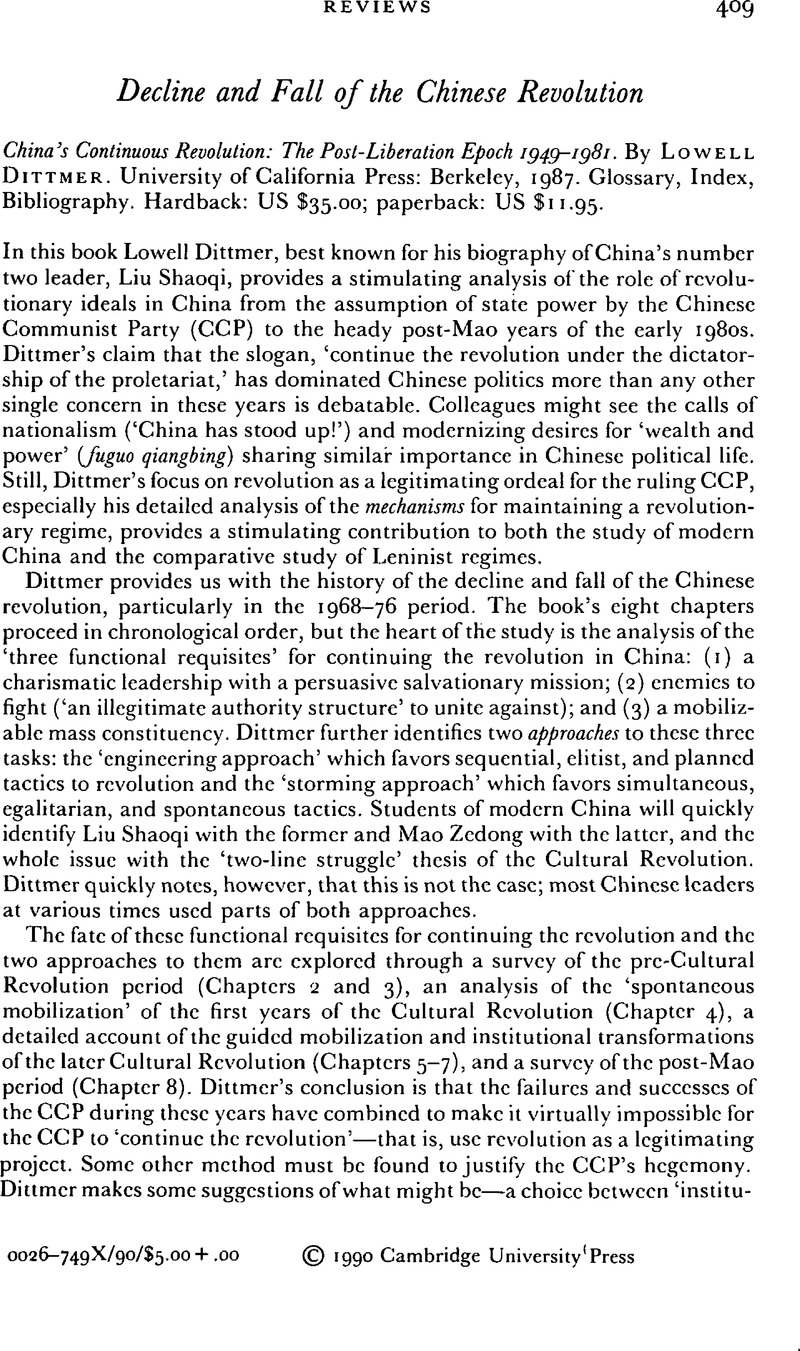Article contents
Decline and Fall of the Chinese Revolution - China's Continuous Revolution: The Post-Liberation Epoch 1949–1981. By Lowell Dittmer. University of California Press: Berkeley, 1987. Glossary, Index, Bibliography. Hardback: US $35.00; paperback: US $11.95.
Published online by Cambridge University Press: 28 November 2008
Abstract

- Type
- Reviews
- Information
- Copyright
- Copyright © Cambridge University Press 1990
References
1 Teiwes, Frederick, Politics and Purges in China: Rectification and the Decline of Party Norms 1950–1965 (Armonk, New York: M. E. Sharpe, 1979) andGoogle ScholarLeadership, Legitimacy, and Conflict in China: From a Charismatic Mao to the Politics of Succession (Armonk, New York: M. E. Sharpe, 1984).Google Scholar
2 Dittmer places both of Teiwes' books in his bibliography and cites him several times, the first on p. 9 quite politely, but never gives page citations, even failing to provide a page for a direct quotation from Politics and Purges on p. 210. This treatment is not limited to Teiwes, and includes other specialists such as Tsou Tang (p. 269) and Martin King Whyte (p. 103). This is all the more remarkable since nearly every other source cited gives precise page citations. It is as if the closer a colleague's work to Dittmer's, the stronger the inclination to keep it at a distance. This is regrettable because these are precisely the scholars with whom Dittmer could best engage.Google Scholar
3 Gold, Tom, ‘After Comradeship: Personal Relations in China Since the Cultural Revolution,’ The China Quarterly 105 (12 1985), pp. 657–75 andCrossRefGoogle ScholarFrolic, B. Michael, Mao's People: Sixteen Portraits of Life in Revolutionary China (Cambridge: Harvard University Press, 1980).Google Scholar
4 Obvious examples, not cited by Dittmer, would include: Goldman, Merle, China's Intellectuals: Advise and Dissent (Cambridge: Harvard University Press, 1981),Google ScholarBinyan, Liu, Between People and Monsters: And Other Stories and Reportage from China after Mao, edited by Link, Perry (Bloomington: Indiana University Press, 1983),Google Scholar and McDougall, Bonnie S. (ed.), Popular Chinese Literature and Performing Arts in the People's Republic of China 1949–1979 (Berkeley: University of California Press, 1984).Google Scholar
5 Once again, Dittmer cites a few of Jowitt's works—on Soviet neo-traditionalism, for example—but does not engage Jowitt's ideas. Jowitt's, The Leninist Response to National Dependency, Research Series No. 37 (Berkeley: Institute of International Studies, 1978)Google Scholar, with its propositions about the nature of Leninist revolutions, would seem a most appropriate work for Dittmer to consider. For example, does the Chinese example support, revise, or disprove Jowitt's thesis about the ‘combined substitution’ of class and status in Leninism?
6 Schurmann, Franz, Ideology and Organization in Communist China, 2nd edn (Berkeley: University of California Press, 1968).Google Scholar
7 Such as the model production brigades and the archetypical rectification negative example, Wang Shiwei. Covered, for example, in Teiwes, Politics and Purges, pp. 58–101 and Wylie (see next note).Google Scholar
8 Wylie, Raymond F., The Emergence of Maoism: Mao Tse-tung, Ch'en Po-ta, and the Search for Chinese Theory 1935–1945 (Stanford: Stanford University Press, 1980).Google Scholar
9 Despite his general approach, Dittmer occasionally lapses into the old usage of ‘ideology’ as synonymous with ‘excuse,’ see his discussion of radical initiatives in the agricultural sector under Lin Biao where those initiatives are seen as stemming from a desire ‘to counter spontaneous capitalist tendencies … [and] partly for ideological reasons…’ (p. 144). How is a desire to counter spontaneous capitalist tendencies different from ‘ideological reasons’? Presumably Dittmer here means concerns of political expediency by Lin Biao.Google Scholar
- 1
- Cited by


